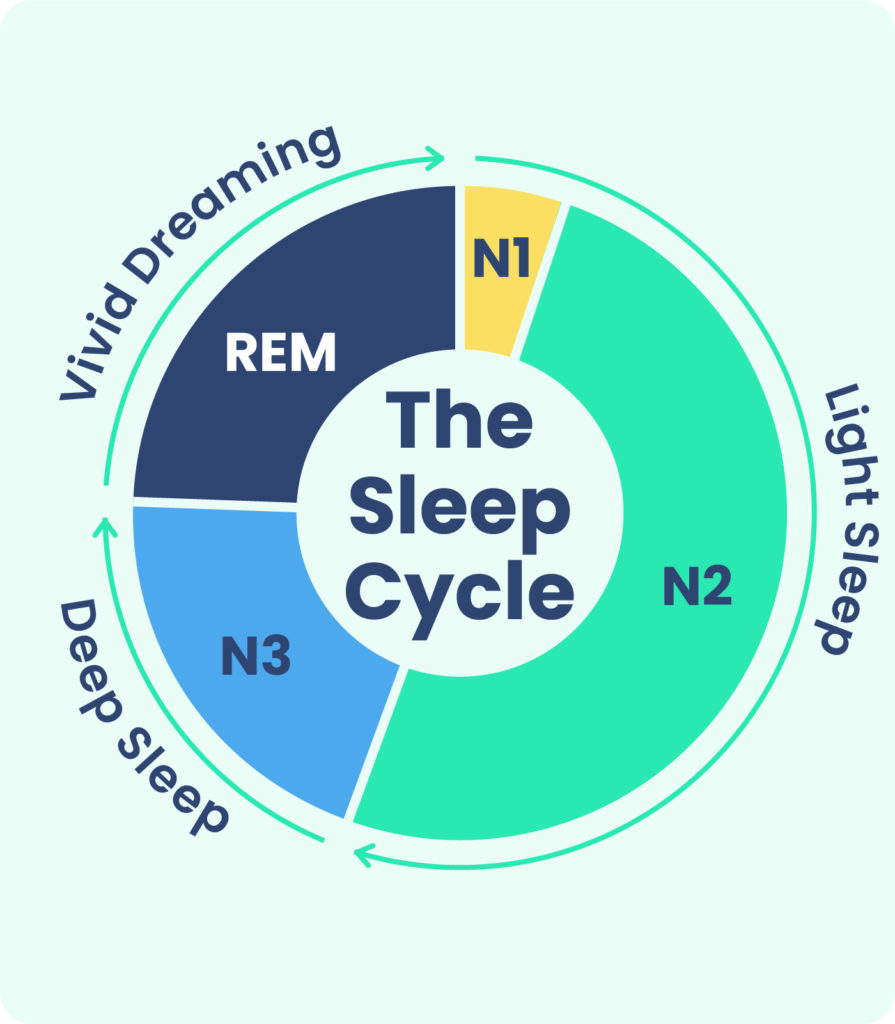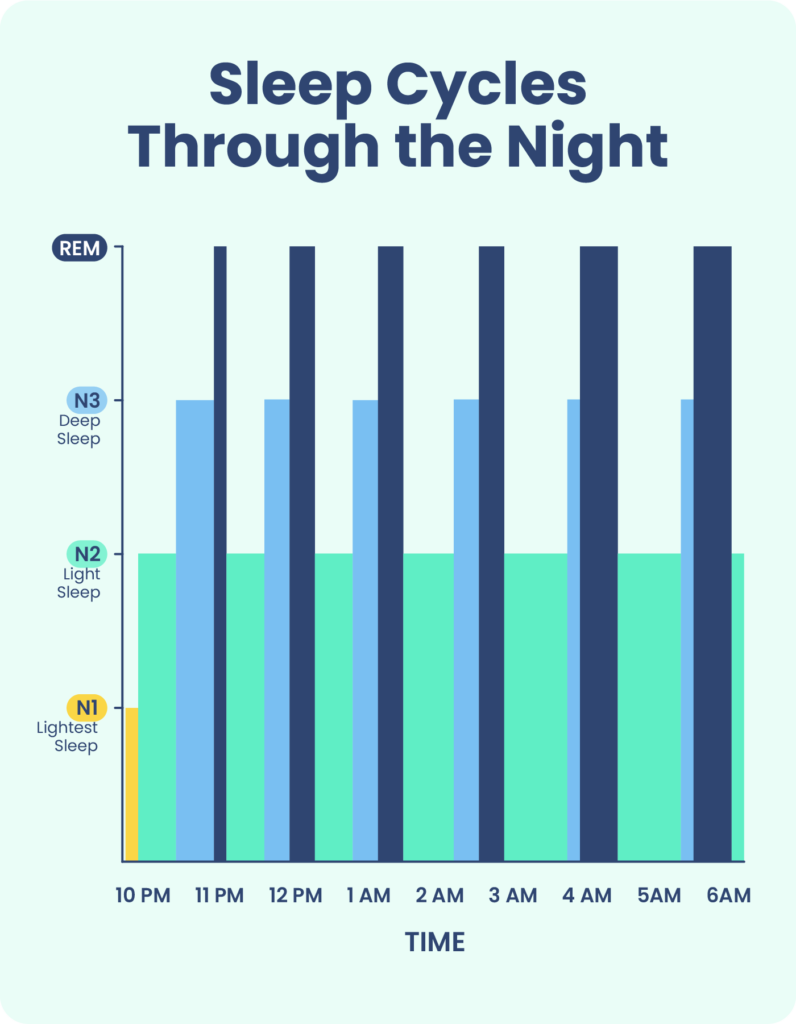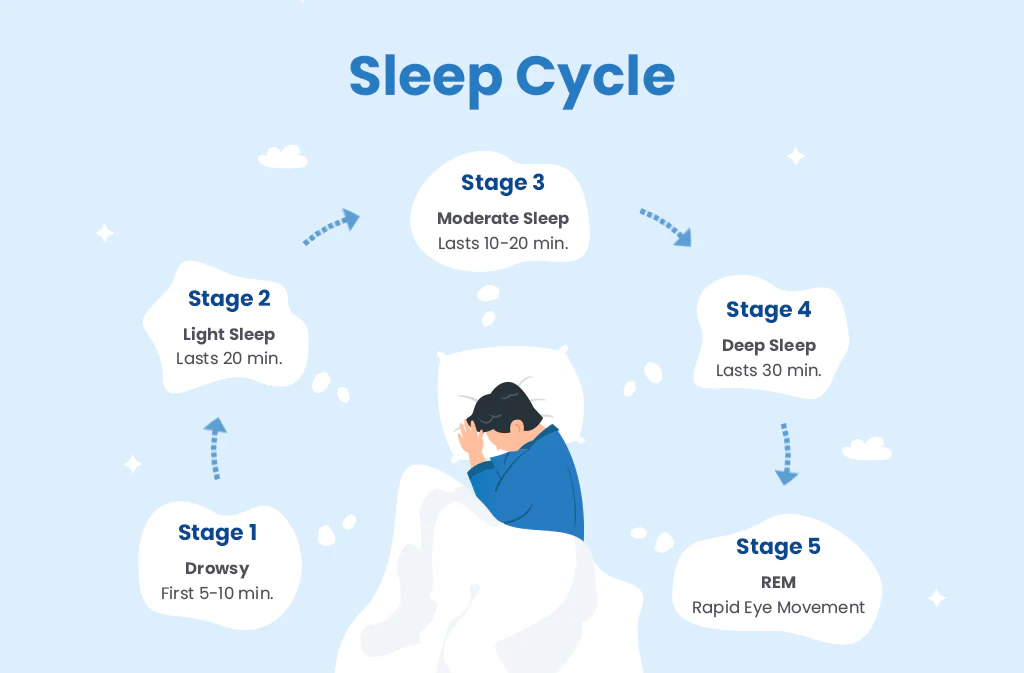The Stages of Sleep: Everything You Need to Know
Discover the 4 stages of sleep, how each cycle works, and why sleeping well goes far beyond just closing your eyes. Understand the science behind REM and non-REM sleep.
Have you ever wondered why some nights you wake up refreshed while others leave you feeling like you barely slept at all? The answer lies in the stages of sleep - a fascinating process your body executes automatically every night, but few people truly understand.
During a typical night, we go through 4 to 6 complete sleep cycles, each lasting about 90 minutes. These cycles are made up of different stages, each with specific functions for our physical and mental health. Understanding how this process works could be the key to dramatically improving your sleep quality.
In this article, you'll discover everything about sleep stages: how they work, how long they last, what happens in each phase, and how to optimize your sleep to wake up truly restored. Get ready for a journey into the fascinating world of sleep!
Table of Contents
- What Are the Stages of Sleep
- Stage 1: Light Non-REM Sleep
- Stage 2: Intermediate Non-REM Sleep
- Stage 3: Deep Non-REM Sleep
- REM Sleep: The Dream Phase
- Duration and Characteristics of Each Stage
- How Sleep Cycles Work
- Factors That Affect Sleep Stages
- Tips to Optimize Your Sleep Cycles
- Disorders That Disrupt Sleep Stages
What Are the Stages of Sleep
Sleep isn't a uniform state where we simply "turn off" for a few hours. Actually, it's a dynamic and complex process, divided into four distinct stages that repeat in cycles throughout the night.
These stages are classified into two main categories: non-REM sleep (which includes stages 1, 2, and 3) and REM sleep (Rapid Eye Movement). Each stage has specific neurological characteristics, different durations, and unique functions for our health.
During a typical 8-hour night, you'll probably go through 5 to 6 complete cycles. In the first cycles of the night, you spend more time in deep sleep (stage 3). In the second half of the night, REM sleep periods become longer and more frequent.
Your sleep quality depends not only on how many hours you sleep, but on how well you progress through these stages. Constant interruptions can prevent you from reaching the deeper, more restorative stages.
To support your overall wellness journey and optimize your sleep naturally, consider exploring wellness products that can enhance your nighttime routine and promote better rest.

Stage 1: Light Non-REM Sleep
The first stage is the transition between being awake and sleeping. It's that moment when you're still somewhat conscious but starting to "drift off." This phase usually lasts between 1 to 5 minutes and represents only 5% of your total sleep.
Characteristics of Stage 1
During this phase, your body begins to relax gradually. Your heart rate and breathing slow down, and you might experience those famous "jerks" or the sensation of falling - this is completely normal!
Your brain waves start changing from the alpha pattern (relaxed wakefulness state) to the theta pattern (light sleep). That's why you can still be easily awakened by external noises or movements around you.
Why This Stage Is Important
Although it's the shortest, stage 1 is crucial because it signals to your body that it's time to begin the recovery process. It's like the "warm-up" before the main sleep workout.
If you have trouble getting past this phase, it could be a sign of anxiety, stress, or an inadequate sleep environment. Meditation practices can be especially helpful for easing this transition. Consider incorporating meditation aids into your bedtime routine to help calm your mind.
Stage 2: Intermediate Non-REM Sleep
Now we reach the longest stage of the night! Stage 2 represents about 45-55% of your total sleep and is where you spend most of your time sleeping. In the first cycles, it lasts about 10-25 minutes, but gradually increases.
What Happens in Stage 2
In this phase, your body temperature drops, eye movements stop completely, and your body enters a state of deeper relaxation. Heart rate and breathing become even slower and more regular.
A unique characteristic of this stage is "sleep spindles" - brief bursts of brain electrical activity that help block external stimuli. It's as if your brain creates a "barrier" to prevent you from waking up easily.
Important Functions
Stage 2 is fundamental for memory consolidation and processing information from the day. It's during this phase that your brain organizes and "files" lived experiences, deciding what's worth keeping in long-term memory.
People who have fragmented sleep and can't maintain adequate periods in stage 2 often report concentration problems and difficulty learning new things.
Stage 3: Deep Non-REM Sleep
Welcome to deep sleep - the most restorative stage of the night! Also known as slow-wave sleep or delta sleep, this phase is absolutely crucial for waking up refreshed and restored.
Characteristics of Deep Sleep
During stage 3, your brain waves become extremely slow (delta waves), and it's very difficult to be awakened. If someone tries to wake you during this phase, you'll probably be disoriented and confused for several minutes.
Your muscles are completely relaxed, blood pressure drops significantly, and breathing becomes deep and regular. This is when your body is in the greatest possible state of physical rest.
The Physical Recovery Phase
Stage 3 is when true physical recovery happens. Your body releases growth hormone, essential for repairing tissues, muscles, and strengthening the immune system. That's why when you're sick, you feel a greater need to sleep.
During this phase, brain "cleaning" also occurs. The lymphatic system removes toxins and harmful proteins that accumulated during the day, including those associated with dementia development.
How Much Time in Deep Sleep?
In the first cycles of the night, you might spend 20-40 minutes in stage 3. As the night progresses, these periods become shorter. Generally, young adults spend about 15-20% of the night in this phase, but this percentage decreases with age.
For those looking to enhance their physical recovery and support deep sleep naturally, quality supplements can be a valuable addition to your wellness routine, especially when combined with proper sleep hygiene.

REM Sleep: The Dream Phase
REM sleep (Rapid Eye Movement) is perhaps the most fascinating and mysterious stage of sleep. This is when the most vivid and intense dreams occur, and when your brain is almost as active as when you're awake.
Unique Characteristics of REM Sleep
During this phase, your eyes move rapidly from side to side (hence the name), even with closed eyelids. Brain waves closely resemble those of wakefulness, and there's an increase in neurotransmitter activity.
Paradoxically, while your brain is hyperactive, your muscles become temporarily paralyzed. This paralysis is a natural protection that prevents you from physically "acting out" what you're dreaming.
Cognitive Functions of REM Sleep
REM sleep is essential for higher cognitive functions. It's during this phase that emotional processing, consolidation of complex memories, and development of creativity and problem-solving abilities occur.
Studies show that people deprived of REM sleep have significant difficulties with learning, emotional regulation, and creativity. That's why a good night's sleep literally "makes us smarter."
REM Sleep Pattern
You only enter the first REM period after about 90 minutes of sleep. Early in the night, these periods are short (10-15 minutes), but in the second half of the night they can last up to an hour.
It's common to wake up during or right after a REM period, which is why you sometimes remember dreams so clearly. The quality of REM sleep is directly related to mental and emotional well-being.
Duration and Characteristics of Each Stage
To better understand how sleep stages work, let's look at their durations and main characteristics in a comparative table:
| Stage | Type | Duration | % of Total Sleep | Main Characteristics |
|---|---|---|---|---|
| Stage 1 | Non-REM | 1-5 minutes | 5% | Wake-sleep transition, normal jerks |
| Stage 2 | Non-REM | 10-60 minutes | 45-55% | Sleep spindles, memory consolidation |
| Stage 3 | Non-REM | 20-40 minutes | 15-20% | Deep sleep, physical recovery |
| REM Sleep | REM | 10-60 minutes | 20-25% | Vivid dreams, emotional processing |
Individual Variations
It's important to remember that these durations are population averages. Each person has their unique pattern, influenced by factors like age, genetics, lifestyle, and health status.
Babies spend about 50% of their time in REM sleep, while elderly people may have only 10-15%. This change reflects different neural development and maintenance needs throughout life.
How Sleep Cycles Work
Now that you know each stage individually, let's understand how they connect in cycles throughout the night. This understanding is fundamental for optimizing your sleep.
The Sequence of a Complete Cycle
A typical sleep cycle follows this sequence: Stage 1 → Stage 2 → Stage 3 → Stage 2 → REM Sleep. Yes, you return to stage 2 before entering REM! After REM, the cycle restarts, but usually skipping stage 1.
Each cycle lasts approximately 90 minutes, but can vary between 70 to 120 minutes depending on the person and time of night. That's why those apps that calculate "perfect" wake-up times are just estimates.
Changes Throughout the Night
The first cycles of the night are rich in deep sleep (stage 3), while the last ones are dominated by REM sleep. That's why waking up too early can leave you physically tired (missed deep sleep), while waking up too late can leave you mentally foggy (excess REM).

The 90-Minute Multiple Myth
Many people believe they should always sleep in 90-minute multiples (4.5h, 6h, 7.5h, 9h), but this is an oversimplification. While it might work for some people occasionally, it doesn't replace the need for adequate total sleep.
The general recommendation of 7-9 hours for adults exists for a reason: that's the time most people need to complete all necessary cycles and get all sleep benefits.
Factors That Affect Sleep Stages
Various factors can significantly alter the quality and distribution of your sleep stages. Understanding these factors is crucial for optimizing your rest.
Age and Life Cycle
Age is probably the factor that most influences sleep patterns. Newborns enter REM sleep directly and spend up to 50% of their time in this phase. As we age, deep sleep gradually decreases.
Elderly people often have more fragmented sleep, with more frequent awakenings and less time in stage 3. This explains why older people may need daytime naps to compensate.
Alcohol and Substance Consumption
Alcohol has a complex effect on sleep. Initially, it may help you fall asleep, but it significantly impairs REM sleep in the first half of the night. As alcohol is metabolized, it can cause frequent awakenings.
Caffeine can affect sleep up to 8 hours after consumption, not only delaying sleep onset but also reducing deep sleep time. Coffee consumed after 2 PM can impact your nighttime sleep.
Stress and Emotional State
Anxiety and stress can keep you "stuck" in lighter sleep stages, preventing natural progression to deep sleep. It's common for stressed people to report fragmented, non-restorative sleep.
Depressive states also alter sleep patterns, often reducing the time to enter the first REM and changing its distribution throughout the night.
Sleep Environment
Room temperature should ideally be between 65-72°F (18-22°C). Very hot or cold environments can prevent adequate transition between stages. Light is another crucial factor - even small amounts can suppress melatonin production.
Constant or intermittent noises can cause micro-awakenings that fragment cycles without you consciously noticing. Investing in a proper sleep environment is fundamental.
Tips to Optimize Your Sleep Cycles
Now that you understand how sleep stages work, let's look at practical strategies to optimize your cycles and wake up truly restored.
Establish a Consistent Routine
Regular bedtime and wake times are fundamental. Your body has an internal biological clock (circadian rhythm) that works better with consistency. Try to maintain the same schedule even on weekends.
A 30-60 minute pre-sleep routine helps signal to your body that it's time to start transitioning to stage 1. This can include relaxing activities like reading, meditation, or a warm bath.
Manage Light Exposure
Morning sunlight helps regulate your circadian rhythm and promotes deeper sleep at night. Try to get sunlight exposure within the first 30 minutes after waking up.
At night, reduce blue light exposure at least 2 hours before bedtime. This includes phones, tablets, TV, and computers. Use warmer lamps or blue light filters if necessary.
Optimize Your Nutrition
Avoid heavy meals 3-4 hours before bedtime, as digestion can interfere with deep sleep stages. If you feel hungry before bed, opt for a light snack with proteins or complex carbs.
Some foods can naturally promote sleep, like cherries (rich in natural melatonin), walnuts (magnesium), and chamomile tea.
Exercise Regularly, But at the Right Time
Regular exercise significantly improves deep sleep quality, but avoid intense activities 3-4 hours before bedtime, as they can be stimulating.
Morning or late afternoon workouts are ideal. They help regulate circadian rhythm and promote natural tiredness at the appropriate time. If you're looking to create a home workout space, consider investing in quality gym equipment or a home treadmill for convenient exercise options.

Consider Natural Supplementation
Some supplements can support sleep quality when used appropriately. Melatonin can help regulate circadian rhythm, especially useful for shift workers or those with jet lag.
Magnesium is another supplement that can promote muscle relaxation and facilitate transition to deep sleep. Always consult a healthcare professional before starting any supplementation. Quality supplements from reputable brands can be found to support your sleep goals.
For those interested in learning more about optimizing their health through nutrition and lifestyle changes, consider exploring diet books that provide evidence-based strategies for better sleep and overall wellness.
Disorders That Disrupt Sleep Stages
Some sleep disorders can significantly interrupt the natural progression through stages, impairing sleep quality even when you sleep an adequate number of hours.
Sleep Apnea
Obstructive sleep apnea is one of the most common and harmful disorders. During the night, breathing is repeatedly interrupted, causing micro-awakenings that prevent entry into deep sleep.
People with apnea rarely maintain adequate periods in stage 3, resulting in chronic fatigue even when sleeping 8-9 hours. Symptoms include loud snoring, breathing pauses observed by others, and excessive daytime sleepiness.
Restless Leg Syndrome
This condition causes an irresistible need to move the legs, especially at night. Frequent movements interrupt sleep cycles, preventing adequate progression through stages.
The syndrome may be related to iron deficiency or other neurological problems, and often improves with appropriate treatment.
Insomnia and Anxiety
Chronic insomnia isn't just about difficulty falling asleep. Many people with insomnia can sleep but have frequent awakenings that fragment sleep cycles.
Anxiety and stress can keep the nervous system in an alert state, preventing natural transition to deeper sleep stages.
When to Seek Professional Help
If you consistently wake up tired even when sleeping enough hours, snore loudly, have breathing pauses, or feel excessive daytime sleepiness, it's important to seek medical evaluation.
A sleep study (polysomnography) can identify disorders that are impairing your sleep stages and allow for appropriate treatment.
Conclusion: The Power of Understanding Your Sleep
Understanding sleep stages is much more than scientific curiosity - it's a powerful tool for transforming your quality of life. When you understand that sleep is a complex process with different phases, each with specific functions, you can make smarter decisions about your nighttime habits.
Remember that quality is as important as quantity. You can sleep 8 hours, but if your cycles are constantly being interrupted, you won't get the restorative benefits you need. On the other hand, efficient and well-structured sleep can leave you more rested even with fewer hours.
The small adjustments we discussed - consistent schedules, proper environment, light management, and mindful eating - can have a dramatic impact on your sleep stage quality. You don't need to make all changes at once; start with one or two strategies and gradually incorporate others.
If you suspect you may have a sleep disorder, don't hesitate to seek professional help. Quality sleep isn't a luxury - it's a fundamental necessity for your physical, mental, and emotional health.
Invest in your sleep. Your body, mind, and daytime productivity will thank you. After all, we spend a third of our lives sleeping - it's worth doing it the best way possible.
How about starting today by implementing one of these strategies? Your future well-rested and energized self will certainly appreciate it!

